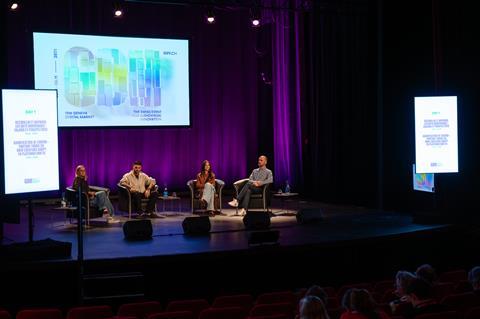
The 13th edition of the Geneva Digital Market (GDM), part of the Geneva International Film Festival, hosted a series of lively debates, exploring where traditional film, legacy TV and streaming collide with XR, as well as social media content and platforms.
Screen downloads some key talking points.
“Audiences are looking out for AI content”
There was a firm warning from YouTube creators about the use of artificial intelligence: Audiences don’t like it.
The creators came together during a deep dive into 20 years of YouTube evolution and its effect on emerging platforms and content creation. The conversation was hosted by GDM head of industry Mathieu Gayet, who wondered if his panellists were eager to use AI to create content?
“The audience is afraid,” said Margaux Fritschy, producer and co-founder Laxar Gang. Her YouTube channel Le Grand JD, the handle for Swiss filmmaker Julien Donzé, has more than four million subscribers and regularly racks up more than a million views for its mix of reportage and investigations into the paranormal, UFOs and grisly crime cases.
“Audiences are looking for any AI content they can identify and will criticise you heavily for it,” said Fritschy, a former journalist.
Melissa Afsin, editorial writer and content creator for Radio Television Suisse’s Tataki, a YouTube channel with more than 650,000 subscribers. Tataki also has a strong presence on other social media outlets such as Instagram, TikTok and Snap. Afsin noted young people in particular are craving authenticity.
“We tried to use AI to create images for a video about ketamine - and people didn’t like it,” Afsin said.
Fellow panellist Anil Brancaleoni, a YouTube content creator whose travel documentaries have attracted more than 670,000 subscribers and millions of views from across the world, said AI can help create efficiencies.
“The work I do for the script of the videos, I do myself. I research my own topics. I do all the interviews myself. The only thing I use AI for is to help me rearrange my work. It’s an efficient tool for that,” Brancaleoni said.
“AI can create videos. [But] people don’t like it, because it’s not natural, it’s not authentic.”
Team with an expert
Partner with established players, was the message from the speakers taking part in a debate examining the potential for XR works to transition from virtual reality headsets to more traditional screens, potentially becoming high-impact films or series.
“You have producers who make documentaries and suddenly they’re making games and they’re writing books and making television series, and they’re not used to it,” said Liz Rosenthal, curator of Venice Immersive and Venice Immersive Market. “It’s always important to partner with experienced producers, because first, they know the medium and second, they have contacts at channels and with investors, which you don’t have.”
Rosenthal was joined by France’s Virginie Béjot, commissioning editor at Arte interactive and Eloise Singer, founder of UK-based Singer Studios, which works across film, podcasts, documentaries, and immersive media. It is one of the recipients of a business development grant from the UK Global Screen Fund.
Singer is presently developing The Pirate Queen, the studio’s multi-award-winning virtual reality (VR) adventure game starring Lucy Liu, as an animated series with an undisclosed streaming platform. She is also co-writing a graphic novel. Additionally,Trailblazer, a 20-minute Meta Quest VR interactive story written and directed by Singer and starring Daisy Ridley, is being developed as a film.
Lesley Paterson, the co-writer of Edward Berger’s All Quiet On The Western Front, is writing the script for Trailblazer. It is based on the true story of German automotive pioneer Bertha Benz, who defied societal norms to embark on the world’s first long-distance automobile trip in 1888.
“It’s that awareness of being able to collaborate with people who have the expertise to bring your vision to life,” said Singer. “ You’re also managing talents, keeping the same core creatives while adding people for the next phase.”
Talent matters
“Any time you’re looking for investment for your project, talent is always important,” said Rosenthal. “For projects I’ve been involved in [as an executive producer], it makes a huge difference bringing names on board for voiceovers, especially in VR.”
Rosenthal has executive-produced XR project Soul Paint, a virtual reality narrated by Rosario Dawson, which was selected for GIFF’s Immersive section in 2024.
Béjot, commissioning editor at Arte Interactive, the French broadcaster’s digital creation unit which spans fiction series, documentaries and immersive experiences, secured the voice of Colin Farrell for animated VR series Gloomy Eyes. Billed as a love story set in a world without sun, where a zombie boy falls in love with a human girl.
“It was great having such a big star,” Béjot noted. However, when Arte turned Gloomy Eyes into a video game, the lead character’s voice was performed by a less-well-known actor.
“It’s always great if a talent is involved as there are things to learn from them,” Béjot said. “But I’d be happy if people just want to experience the story, no matter what.”

























No comments yet